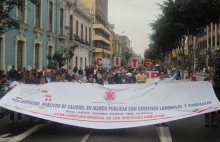Unity of action drives social dialogue forwards in the Andes

After decades of negative propaganda by governments and employers, Andean public sector unions are perceived poorly by the general public. Human and trade union rights have stagnated and are constantly violated, privatisation has weakened unions and their possibilities for collective bargaining have decreased. However, it is surprising what a bit of regional government competition can do to encourage attitude change and this time round Colombia made the most encouraging progress.
At the start of the project, a Network of Andean Public Administration Unions was created. During the planning workshop, based upon the ‘Education for Liberation’ model, each country prioritised a campaign and participatory research area. As Veronica Montufar explains:
“In the beginning, for unions used to working in a top-down manner, the idea of a network which operates horizontally was strange but it soon became a model for cooperation, solidarity and shared decision making. In between face-to-face meetings we met virtually once or twice a month. We monitored progress, took decisions and offered practical solidarity when network unions were under threat.”
At the second Network meeting, union representatives decided to turn the research into a comparative study of legislation and labour practices in the Andean Public Sector. The results of this decision convinced the ILO Andean Office in Peru, to join PSI in bringing governments and unions together on World Public Services Day 2011, to analyse the findings and articulate a way forward.
During the meeting, the Colombian unions, presented their use of the 20th anniversary of the Colombian constitution (which opens the opportunity for ‘constructive labour laws’) to propose a way for the Government to finally abandon laws that artificially divide administrative and manual public sector workers. The Colombian Vice-President, an ex-trade unionist, offered to host an Andean meeting in Colombia that was subsequently successfully held in 2012. This has confirmed PSI and its affiliates as being the most legitimate trade unions body representing and defending public sector workers. Patricia Lozano, Sub-regional Coordinator of the Andean Network of Public Administration explains further:
“Importantly, we managed to develop a proposal for a single labour status, which has been accepted by the three national trade union centres and by members of the Colombian Congress and Government and I am satisfied to know that the Colombian government is now contributing to our objective.”
Today, Public Sector Unions in Ecuador, Peru and Bolivia are all in the process of lobbying for formal bipartite social dialogue spaces to discuss the unions’ proposals. However, in Colombia discussions have already begun and government and unions are busy holding regional and city forums to record “Right to Public Sector Collective Bargaining” consultations – a particularly contentious and long standing subject.
As she explains, Veronica has high hopes for a future in which the Network facilitates future progress.
“Although we no longer hold joint activities because the project has ended, the network still works and we are still sharing and thinking about what to do next together and how to take a step forward towards a real transformation process of state and public services for all.”
This PSI project “Equality and Equity in Public Services in the Andean Region” was supported by affiliate IMPACT (of Ireland) in collaboration with FNV Mondiaal (a trade union solidarity support organisation from the Netherlands).
For a complete survey of IMPACT/PSI trade union development cooperation between 2008 and 2013 click here: In the People's Interest
Map: IMPACT/PSI project collaboration between 2008 and 2013

